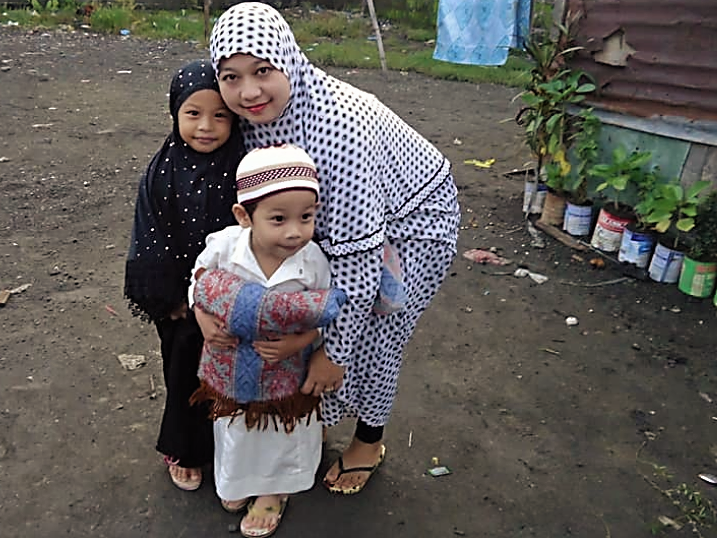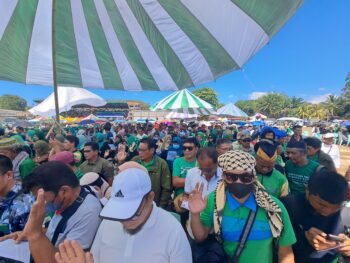 Marineth Agustin-Karim and her children dressed in their special garb for a religious event. Photo courtesy of Marineth Agustin-Karim
Marineth Agustin-Karim and her children dressed in their special garb for a religious event. Photo courtesy of Marineth Agustin-Karim
GENERAL SANTOS CITY (MindaNews / 24 March) – Marineth Agustin-Karim, an Ilocana mother of four, was busy preparing their house as she and fellow Muslims in their neighborhood in barangay Poblacion 6, along the Rio Grande de Mindanao in Cotabato City, eagerly wait for the new moon to be sighted, a signal for the start of the holy month of Ramadan.
Karim never thought that she would be among the millions that fervently wait for the ninth month of the Islamic calendar, a holy period when Muslim faithful indulge in prayers, sacrifices, and other events that “enrich the soul and relationship with the Almighty Allah.”
Two decades ago, the 35-year old Karim was living a carefree life as a student in a university in Laoag City, Ilocos Norte, where many have a stereotype thinking about Mindanao as a place of war and violence, and of Muslims as violent people.
Mindanao is home to the majority of the Filipino Muslims, where over 90 percent of the country’s Islamic faithful resides, more than half of which live in the Bangsamoro Autonomous Region in Muslim Mindanao.
“I have thought before that Muslims are bad, but, here I am now a Muslim, not by chance but by choice,” Karim said over a video call on Thursday, March 23.
It may be noted that many of the soldiers that were sent to Mindanao during the Martial Law era came from the Ilocos and other provinces in the north.
Karim arrived in Cotabato City in 2005, where she was sent to study, leaving her parents and siblings in Ilocos to seek education and a good future in Mindanao, the so-called Land of Promise.
“But love came in the way,” Karim said laughing, and the Ilocana got married to Maguindanaon Aladdin, her Muslim husband for 16 years now.
With four kids to raise, the eldest being 15 years old and the youngest two years old, the husband travels almost 400 kilometers every other day between Cotabato City and this city to buy fresh fish and seafood which the couple sells to provide for their needs.
Traveling such a lengthy distance entails so many risks like possible mishaps and the volatile peace and order condition along the highway between the two cities, “and you just have to trust the power of the Almighty to protect you,” Aladdin said.
“That is my commitment to my family, to be able to live a life in accordance with the wishes of the Almighty,” Aladdin said.
Marineth recalls her first Ramadan experience, saying she was apprehensive about fasting and might not be able to complete the process.
“The thought of not eating for hours scared me, but as it turned out, Ramadan was more than just skipping meals,” she declared. It was then that Karim learned about Ashra, “the three stages of Ramadan which were designed by the Almighty Allah.”
Rehmah, the first ten days, open the mind and heart for one to reflect and realize the mercy of the Almighty despite mistakes that were committed against oneself and others, she said.
“Ditoy maamwan nga adu gayam ti dakes nga masapol lisyan (Here you will realize the many sinful acts that has to be avoided to remain clean and pure),” she said in Ilocano.
Then comes Maghfirah, the second stage, reflecting the forgiveness of Allah.
In this stage of the second ten days of Ramadan, she said it is the time to seek the forgiveness and repentance of all sins, saying in prayer, “I ask forgiveness of my sins from Allah who is my Lord and I turn towards Him.”
The third Ashra, which is the last ten days of Ramadan known as Nijat, is turning to Allah to be safe from the fire of hell.
Marineth said the last ten days of Ramadan are the most important as it is in this stage where the night of power or Lailatul Qadar occurs and “appears to those with the cleanest and purest of intentions.”
So many desire to witness the Lailatul Qadar but one needs to be worthy to do it, she pointed out.Karim said that during the past 15 Ramadan she had observed that there is truth to what her fellow vendors have claimed that while Ramadan is a month for sacrifice, it is also a month of harvest, a period that is full of blessings from the Almighty.” (Rommel G. Rebollido/MindaNews)
